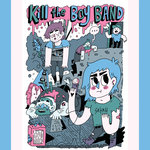

The journey of Emma Grrl, 26, the multi-instrumentalist bookworm troubadour behind the Lansing punk group She/Her/Hers, begins outside of San Diego. Even though she’s now in several bands, such as Rent Strike and Grey Matter, that reside confidently on the cutting edge of underground sounds and politics, Grrl’s origins have the same late-’00s suburban DNA shared by many millennial musicians.
However, the generic classic rock staples of the Guitar Hero soundtracks, or secondhand tunes from her parents’ stereo, would not be the defining music that informed the styles of She/Her/Hers. A teenage Grrl found the proper dosage of inspiration from hearing folk punk band Against Me! at an open mic night.
“I said, ‘This is incredible! What is this?’ Over that summer I got really into Against Me! and Defiance, Ohio, and Nana Grizol — those were definitely the bands,” Grrl said. “I loved all of ‘Reinventing Axl Rose.’ ‘Baby I’m an Anarchist’ is a song I played at open mics hundreds of times.”
That spirit carries over into her involvement with Rent Strike, which is performing Jan. 24 at Mac’s Bar as part of a fundraising effort for The Commons — a planned east-side neighborhood community resource center.
Perhaps more important than the actual music of these bands to Grrl is their radical leftist politics overtly inspired by anarchist literature, such as the works of Emma Goldman.
The aforementioned ‘Baby I’m an Anarchist’ features lyrics about chucking bricks at Starbucks’ windows. Defiance, Ohio’s debut LP, “Share What Ya Got,” contains romanticized passages of anarcho-collectivists building their own free societies.
“I didn’t start reading people like Goldman until I was much older,” Grrl said. “I was a part of a crew of punk kids from my shitty suburban hometown who introduced me to really good politics and called me out on my fuck-ups.”
When listening to music that urges you to set the world afire, it’s hard to keep yourself bottled up within the confines of a bedroom. So Grrl injected herself into the DIY music scene of San Diego, hanging with an older punk rock crowd.
“I had very little formal training — I would just cover bad Johnny Hobo songs. When I was 16, I started joining bands in San Diego. I kind of forced myself in with the 25- to 30-year-olds. I bought an accordion, and it’s really easy to join bands when you play the accordion ’cause nobody else plays that,” Grrl laughs. “I didn’t start writing my own songs until I was 20.”
In proper punk kid fashion, Grrl didn’t hang around her hometown for much longer. She underwent several odysseys, driving her Mazda 3 back and forth from coast to coast performing solo acoustic shows as She/Her/Hers. Through this chaotic period, Grrl lived in Portland, Oregon, briefly, before eventually finding a more permanent home in Boulder, Colorado.
After gathering some bearings in Boulder and meeting eventual partner Piper Bazard, Grrl, joined by makeshift producer Jon Pizarro, recorded She/Her/Hers’ seminal project — the “Grrl Angst” EP. The album found itself becoming a beautiful, retrospective expression of Grrl’s trans identity. With songs like “Gender is Boring” that feature lyrics such as, “Cause if I use she pronouns, well, what does that mean? Am I reinforcing a gender binary that I don’t believe in; that I don’t adhere to. I say I’m a woman, what’s that supposed to tell you?” Grrl used the project to write clever ruminations on her escape from the bondage of oppressive gender roles and sexual identity. Female-identifying, but preferring her unkempt black shirts and jeans, songs like “Never Pass” proudly eschew the idea that Grrl must be complacent with society’s image of how a woman is supposed to appear.
“I remember vividly having a conversation at around 3 a.m. I told my friend, ‘I don’t know how I am supposed to feel about being trans. I feel like I am buying into this toxic binary,” Grrl explained. “But I think I was missing the point. Being trans doesn’t mean I am buying into antiquated gender norms. A lot of it comes down to my enjoyment of using she pronouns, while not being super femme-presenting. I think it’s really cool and powerful to be trans and butch.”
She explained the majority of the lyrics from “Grrl Angst” were inspired by recontextualizing the myriad feelings she experienced during the process of becoming comfortable with being out.
“I wasn’t working a normal job, so I didn’t have to fit into the normal trans narrative of passing and living within a heteronormative society,” Grrl explained. “It allowed me to talk openly about living on the fringes — not just in an economic sense, but also in the sense of gender and sexual identity. Younger trans folk are surrounded by people that don’t get it, being around people who got it opened up a whole new world.”
After releasing “Grrl Angst,” Grrl found time to partake on yet another odyssey with fellow anarchist travelers Chatterbox — a band featuring musician John Warmb from the Lansing folk group Rent Strike. Meeting Warmb formed an important connection that eventually drew Grrl to Michigan.
“On that tour, there were two people from Arizona, two people from Colorado, one from Texas and John was from Michigan. We were all like, ‘Oh we hate where we live! We wanna move! We should all move to one place together,” Grrl said. “John was like, ‘I’m not moving, I love Michigan.’ So we said, ‘All right! Guess we’re moving to Michigan!”
Taking She/Her/Hers to Lansing saw the band evolve from just Grrl and her acoustic guitar to a full-fledged electric punk band. After filling out the lineup, which includes Piper Bazard on trumpet, Cody Kuuttila on drums and Jake Matter on Bass, Grrl met and formed an important connection with Joe Steinhardt of the nationally renowned independent music imprint Don Giovanni Records. Steinhardt, who briefly resided in Lansing while teaching at Michigan State University, suggested that Grrl do a release with the label, and that became “Kill the Boy Band.”
The three-song release, anchored around a rerecording from “Grrl Angst,” is an important musical evolution for She/Her/Hers that highlights Grrl’s improvement as a songwriter and singer. The titular song, “Kill the Boy Band,” is a fierce indictment of a lack of diversity in independent music scenes. On the track, Grrl is more than just jaded with male-dominated gigs and movements.
“The narrative I see when I talk to people about diversity in their bands, and the pushback I get is, ‘We’re all just friends, it’s not like we specifically picked out white guys for our band,’” Grrl said. “Well, maybe it says more about the fact that you’re not friends with people that don’t look exactly like you. It’s a microcosm of a bigger problem. I don’t think it’s that hard to have a diverse scene.”
With two successful and uncompromising releases under the name She/Her/Hers, Grrl is moving her musical inspiration beyond the politics of gender and sexual identity. Not wishing to be painted into a corner, Grrl said the “cautiously optimistic” future for She/Her/Hers will see the band move even further beyond the confines of punk rock, and address issues such as climate change through its lyrics.
“I see us moving away from punk. There will be a lot more piano on future records — more horns, more strings. Probably a lot softer in general,” Grrl said. “I don’t write about gender as much anymore. I think that perspective is always going to color things, but it’s no longer the primary driver. A lot of my songs have been about climate change. What does it mean to live in a world that’s falling apart and it’s also somewhat your fault? How do you reconcile with being part of the problem? But I don’t have many answers.”
She/Her/Hers can be followed on Facebook and Bandcamp.
The Commons Fundraiser at Mac’s Bar
W/ Mover Shaker, Rick Johnson Rock and Roll Machine
8 p.m., Jan. 24, Friday
2700 E. Michigan Ave., Lansing
(517) 484-6795, Facebook.com/macslansing
Support City Pulse - Donate Today!
Other items that may interest you

Comments
No comments on this item Please log in to comment by clicking here